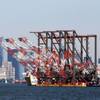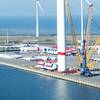West Coast Port Dispute Reach Tenative Deal
The longshoremen and West Coast shippers have reached a tentative pact that addresses issues relating to pension benefits and arbitration procedures, including technological advancements. The agreement will allow the introduction of technology that would improve the flow of cargo through the West Coast terminals. The entire agreement which was announced late Saturday must be approved by members of the ILWU. Negotiations were guided by Peter Hurtgen, director of the Federal Mediation Conciliation Service.
In a statement, the president said: "I am very pleased that labor and management have reached an agreement concerning the West Coast Ports. This agreement is good for workers, good for employers, and it's good for America's economy. I congratulate labor and management for working together to successfully resolve their disagreements and I also commend the efforts of Labor Secretary Elaine Chao and the Director of the Federal Mediation and Conciliation Service, Peter Hurtgen, for their tireless efforts in bringing this matter to a successful conclusion."
The West Coast dockworkers committee will meet on December 9 to address the agreement between West Coast shippers and longshore union workers. If the agreement is met, the six-month negotiation appears would be resolved based on a tentative agreement reached over the weekend and submitted for final approval by the union's oversight committee.
"I'm just glad they were able to settle this thing without another shutdown or before local business and consumers got washed out to sea," said Senior Vice President of Economic and Public Policy Wally Baker, Los Angeles Economic Development Corporation (LAEDC). "The LAEDC today (Nov. 25, 2002), released new estimates as part of the OnTrac rail study placing the total trade disruption cost at $6.28 billion for just the two Los Angeles basin ports. This represents about two-thirds of the total trade value interrupted by the West Coast ports dispute."
According to longshore union and shipping company representative's new technology improvements, a major sticking point, were included in the final contract. National transportation consultants predict that the implementation of the new agreement will greatly increase productivity at West Coast ports but pave the way for congestion problems in trade corridors across the country.
"These productivity improvements increase the output of our ports and are going to be great initially," explained Baker, "but after they get implemented, California's trade corridors and the trade routes to the Midwest, East Coast and Southern United States are going to be in hot water. There was already a lot of trade congestion on rail corridors in the heartland before the productivity improvement at the ports. Our studies of just the LA basin rail corridors forecast about a four-year capacity on Southern California rail corridors, but that was before the new technology agreements. The changes will improve the ports' productivity, which is a good thing, but it will also increase the number of trains moving through the nation's corridors. I know Chicago, New York-New Jersey, and many, many other areas of the country are already in serious trouble with corridor capacity constraints. Increased efficiency on the West Coast is going to lead to serious rail congestion if we don't address the corridor capacity problem."
Sponsored Content
Innovative Hull Maintenance: Profitable & Green

Subscribe for
Maritime Reporter E-News
Maritime Reporter E-News is the maritime industry's largest circulation and most authoritative ENews Service, delivered to your Email five times per week













